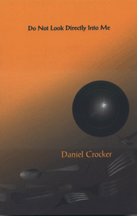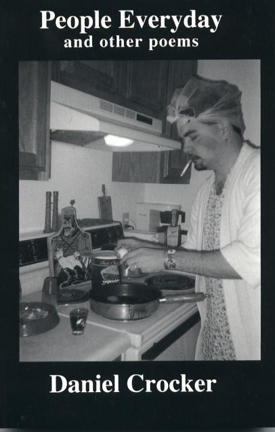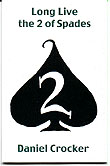|

Do Not Look Directly Into Me
A Collection of literary and experimental short stories.
Do Not Look Directly Into Me is a collection of 23 short stories that explore, religion, homosexuality, family, sex, just about everything. "The Bird" is about a young man walking home from church after being molested. "Glass Vases" is about what a young man does when his mother goes to jail for writing bad checks. The tone of the stories range from humor to anger to sadness. Not all are for the week at heart. As Alan Catlin wrote, "some [of these stories] are gross, indecent and vile . . . but all have a certain quality, a humanity, that make this collection worth reading."
Do Not Look Directly Into Me was a Small Press Review Pick of the Month for Oct/Nov 2002.
Professional Reviews
From Nate Graziano, editor of The Brown Bottle
One question kept surfacing in my mind as I read through Daniel Crocker's First collection of short stories, Do Not Look Directly Into Me: What is in the water in the state of Missouri. These Meticulously crafted and vastly entertaining tales of the plight of the blue-collar American resonate with a narrative voice that simply drips with pithy, poignancy and an understated humor that isn't all that far removed from another famous Missourian writer, Mark Twain. Perhaps Crocker's most luminous gift is his inimitable control of language. He's able to brush stroke the most outrageous and creative stories with a fine layer of verisimilitude. In "Even Dishwasher's Dream" a dishwasher is confronted by a pair of opportunistic space aliens who attempt to recruit him for an intergalactic dishwashing team. Yet underneath the fatuous plot lurks the candid and solem yearnings for and American Dream gone stale. Crocker takes a number of stylistic chances in Do Not Look Directly Into Me and lands on his feet in just about everyone of them. In experimental stories such as "Inner Charlie," "Isabel and I," and "Father, Son, and The Holy Ghost," he manipulates language and molds it into new shapes with pristine craftmanship. Daniel Crocker is one of the few trailblazers in today's small press literary scene, and this become abundantly apparent in this collection. A beautiful all-around effort---meticulously edited with a beautiful cover design by Karen Ostrom, Do Not Look Directly Into Me is a profound collection of extraordinary strength and range. Daniel Crocker establishes himself as one of the premier storytellers in the small press. I highly recommend buying this collection. And whatever is in the water in Missouri, we should all try some of it.
from From the Marrow
An outstanding collection of short stories, this is a full-sized paperback which sucks you right in and keeps you turning pages. Crocker uses a variety of tricks and devices to break new ground in nearly every tale. You'll find sordid life here, and you'll find real beauty too. Reviewed by John Berbrich, "From the Marrow"--A review sheet from Bone world Publishing, 3700 county Route 24, Russell, New York 13684
Reviewed by Joe Verrilli, editor of Shoes and Ragtime Joe's Reviews
Do Not Look Directly Into Me features twenty three stories written from a working class perspective, uniquely crafted narratives that run the emotional and psychological gamut . . . These are more than just stories; with his usual gut-wrenching honesty and unihibited wisdom, he has chosen certian subject matter as a springboard for telling us about his life . . . no matter what the reader's social class or personal circumstances might be. Crocker's narratives rise above mere categorization. How he has accomplished this with seemingly as much ease as he had, I'm not exactly sure. His titles include: Inner Charlie, Snakes, Father, Son, Holy Ghost, Even Dishwashers Dream, and Spontaneous Meditation of Dishwashing, but, for myself, the most powerful story (on several different levels) is "Glass Vases," which begins this way: "My family talked more to each other the day my mom went to jail than they had since everyone but me either died or moved out." From there, the reader is drawn into a slowly evolving mystery about the narrator's mother and her penchant for writing bad checks. Without giving away the conclusion, I have to say that this story touches upon every human emotion possible. This is a very attractive book, featuring lengthy quotes by Gerald Nicosia and Gerald Locklin on the back cover. Everyone out there certainly owes it to themselves to dive into this fascinating collection of stories. If one has any appreciation for the short story medium, as well as great writing, this book should be required reading!--Joe Verrilli
Book Review by Joyce Metzger
DO NOT LOOK DIRECTLY INTO ME
by Daniel Crocker
2002; (p/b 182pp) Cover Design by Karen Ostrom, Green Bean Press,
POB 237, New York City, NY 10013
$12.95
Daniel Crocker identifies himself as being a dishwasher from
Leadwood, Missouri, who just happens to be a writer. After dipping
into this book of short fiction, I would say that Daniel Crocker
is a writer, who just happens to be a dishwasher; and a teacher of
composition at Southest Missouri State University. His short fiction
has won awards, but he doesn't name them. He has a wife, Margaret and
two daughters (age 2 and 6), and did I say, in his spare time, Daniel
Crocker writes good fiction?
"Hey--ain't you Dan Crocker? Where's the depression--where's
the famous rants about your brother--where's the human comedy melodrama?
I want to read something fuckin' honestly depressin'."
"Do Not Look Directly Into Me is a book about humanity where it is
hardest hit, in the devastation of broken families, large and small
losses, and the daily defeats it can at times seem impossible to
surmount. --Gerald Nicosia, author of Memory Babe and Home To War.
When one author can hand another honest kudos, the thoughts are
doubly appreciated, and taken to heart. Both know the time, intensity
of focus, and lonely dedication one must undergo, to become a successful
author. Scenerios are everywhere. Everyone can dream and day-dream,
but few are able to articulate well enough to capture the imagination
of others. These few, are called writers. Gerald Nicosia spent ten
years interviewing, sorting, filing, writing, correcting and re-writing
"Home To War". His words of praise for Daniel Crocker's work are not to
be taken lightly, or shrugged off.
Crocker's titles whisper strains of imagination: Kryptonite,
Leader-Rock, Poor Circulation, Glass Vase, Snakes, Chicken Blue,
Even Dishwashers Dream, The Insect Family, In With The Trash. These
gently nudge minds, and curiosity will stir the intellect.
His first sentence grabs and holds on tight...
"I was in bed when my wife died. I wasn't sleeping, however.
Then the knock came on the door (I've never had a phone). It
was her mother. Her face was red. She was crying.
She tried to put her meaty round arms across my shoulders around
my neck I pushed her away we've never gotten along.
Get out of here." I told them both.
Crocker uses short clipped sentences and plain language as he
expresses distaste, desire, lust, regret, or curiosity. He experiments
with punctuation (as you notice there are not any periods in the
sentences just quoted. This is a departure, not exactly stream-of
consciousness, but certainly a unique experimentation.
"Do you believe in fate, Doctor?
Fate?
Are you determined? Predestined"
Words are woven into chains. "It's all a matter of words.
Semantics." A supposedly cowed patient becomes subtly, then more
actively aggressive, in a (psychiatrist's) office. "I love the Devil.
I'm going to burn you, you know." Mind games turned ugly, reasoning
with the unreasonable. Patients who see faces in the wood of doors.
"Horror writers and religious fanatics are always finding faces in
things. In tree bark. In clouds. In tortillas even."
Chilling, but Crocker glides smoothly, weaving newer patterns,
drawing readers onward, deeper into the maze.
"The snake darted its tongue in quick jab-like flurries as it
brushed its tail against the stone...The Stone struck with fiercer
energy. This time the stone had taken flesh with it and eaten a red
hole into the pretty thing. It's spasms were so alien. The more it
thrashed around in death, the more I hated it."
"Dad sat down in his chair...Finally, "Did you kill that snake out
there?"
"You know," he finally said, voice deep, "ugliness always tries
to kill beauty." Silence. "Understand?"
Yes, the protagonist did, and so does the reader. Lessons again
interwoven into the tapestry of Daniel Crocker's words. "But for now,
peace. I knew that if I could fall into those waters (Freeman Lake) I
too would have it--peace forever...But the rain was going to come soon
and I started to fear it.
"Two creatures appeared. We are scouts from out there. We have
searched three galaxies for the fastest dishwasher in the universe."
"I don't know," I said, "I don't like dishwashing very much."
"You don't like dish washing? We have hopes that you could go
down in history, as the greatest dishwasher to ever play the game."
"I'm a writer."
"Anyone can be a writer. Writers are a dime a dozen. Women
don't scream and spread their legs for writers."
Daniel Crocker has a very active and stimulated imagination. He
also has a great deal of talent. He is the author of "How To Make Love
To Oprah All Night Long And Have Her Begging For More", and two
books of poetry, also from Green Bean Press,"People Everyday and
other poems" and "Long Live the 2 of Spades." Plus 10 other book
offerings; fictional stories, and some, of poetry.
No subject is taboo. And, all objects, emotions, desires and
experiences are fuel to light and keep glowing, his writing talent.
Order "Do Not Look Directly Into Me," from, Green Bean Press.
Inquire about other books. Or visit the site online at:
http://home.earthlink.net/~gbpress. It's worth the visit.

PEOPLE EVERYDAY AND OTHER POEMS
If Will Rogers were a young man in the 1980's:
a. he would have been disgusted with the lesser quality of leaders
running this country.
b. he would have deplored banks foreclosing
on farms faster than the speed of profit.
c. he would have hailed rap music as the only
social voice with any integrity left in America.
d. he would probably have authored "People
Everyday And Other Poems."
You decide. I want to make comment on the soulful observational powers Daniel Crocker employs in this first book of verse "People Everyday And Other Poems" which leaps beyond the creative - writing - cours nonsense that stirs nothing worthwhile. The honest among us will point to the Soul as the center of any moving work of art. Sadly, though, as we slip into the third millenium, one could not locate soul in American poetry if you ransacked the university poet's theology department.
Blue-collar experience and aspirations seem frozen in videocassettes of "Rocky" as if sealing off additional commentary. Yet we must not lose sight of the fact that the story of America and its vaulted "Dream" does not orbit the academic or the captain of industry. It is still about the common man carving out a place for himself and his family in a world of stone. Theirs is the transition from dirt floor to carpet. Their labour is covered in sweat and blood. Their money is earned; not inherited. Their work ethic ancient and unpolluted.
In the consumer-made universe of Western culture---products are devices deliberately separating humanity from Nature and its mortal fears: "Dead Men:
I saw a photograph today/of a dirty brown skeleton 4000 years old... He was in a fetal position/fear and hands near/2 empty bowls/ mouth a gaping hole. This is how we really die--/curled up like babies and scared--/not laid out in suits/hands crossed over chests and eyes closed."
Crocker's compassion never taints the brutal truth of a complex world ready and willing to devour dreams and desires regardless of one's background or station in life:
"People Everyday:
People everyday
turn into what
they were
not meant to be...
What other people want them to be
to zombies
to machines
to madmen
foaming lucifers.
People everyday
troubled become addicted
clasp
rage tightly between walled teeth.
People everyday are
connected
by eyes to screens.
People everyday
are lonely
are afraid
losing children
childhood
taking last breaths.
People everyday
have seen better times...
We are/people everyday
pretty much
what people have turned us into
after what we turned them into
and
it is time to be born."
Daniel Crocker is a poet of immense value; not because he is some sort of literary genius (only a greater body of work and history makes such judgement) but precisely because he is producing work other American poets are not: writing that speaks to and about real people. We are not pummeled with ancient Greek references. Pseduo-Steinbeckian romantic notions do not spill into our living rooms. Suburbia is not held up as the only place civilized human beings reside. And five hundred academic journal credits are mercyfully absent---one of the few sure signs the verse is not infect with yuppie self-indulgence.
Instead the readers are visited with crisp observations of average people in everyday discovery of what makes their lives work and hurt. Individual social evolution or devolution are carefully described in plain terms or venacular that heightens the impact of many fearless portraits of distressed humanity. Crocker reminds us (and we do need reminding) what good poetry is all about: a big heart, an honest eye and a couple score of sincere words. Don't punish this poet for the sins of the literary establishment. Support his work and others like it. You'll save the 21st century for the next generation of poets.
Crocker shoots from the hip. Hes a no-nonsense reincarnation of the tell-it-as-it-is, no frills, gut-level spirit of the 60sThe amazing thing here is that I never feel hes faking it the way, say, Bukowski would creating a phantom Persona that he sends out into the world to do Anti-Superman impossible tricks. --Hugh Fox, Small Press Review.

Long Live the 2 of Spades
The excitement of this book is how he reveals events in small town America; earth-bound, genuine, and in a strange manner, wholesome. This is a uniquely talented artist who refuses to be quiet.
Arnold Falleder, Independent Publisher.
This is the final volume of Crockers 2 of Spades trilogy.
Enter content here
|

